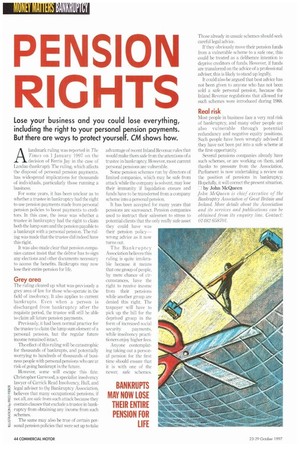PENSION RIGHTS
Page 46

If you've noticed an error in this article please click here to report it so we can fix it.
Lose your business and you could lose everything, including the right to your personal pension payments. But there are ways to protect yourself. CM shows how.
Alandmark ruling was reported in The Times on 1 January 1997 on the decision of Ferris Jay in the case of Landau (bankrupt). The ruling, which affects the disposal of personal pension payments, has widespread implications for thousands of individuals, particularly those running a business.
For some years, it has been unclear as to whether a trustee in bankruptcy had the right to use pension payments made from personal pension policies to boost payments to creditors. In this case, the issue was whether a trustee in bankruptcy had the right to claim both the lump sum and the pension payable to a bankrupt with a personal pension. The ruling was made that the trustee did indeed have this right.
It was also made clear that pension companies cannot insist that the debtor has to sign any elections and other documents necessary to access the benefits. Bankrupts may now lose their entire pension for life.
Grey area
The ruling cleared up what was previously a grey area of law for those who operate in the field of insolvency. It also applies to current bankrupts. Even when a person is discharged from bankruptcy after the requisite period, the trustee will still be able to claim all future pension payments.
Previously, it had been normal practice for the trustee to claim the lump sum element of a personal pension, but the regular future income remained intact.
The effect of this ruling will be catastrophic for thousands of bankrupts, and potentially worrying to hundreds of thousands of business people with personal pensions who are at risk of going bankrupt in the future.
However, some will escape this fate. Christopher Garwood, a specialist insolvency lawyer of Carrick Read Insolvency, !lull, and legal adviser to the Bankruptcy Association, believes that many occupational pensions, if not all, are safe from such attack because they contain clauses that exclude a trustee in bankruptcy from obtaining any income from such schemes.
The same may also be true of certain personal pension policies that were set up to take advantage of recent Inland Revenue rules that would make them safe from the attentions of a trustee in bankruptcy However, most current personal pensions are vulnerable.
Some pension schemes run by directors of limited companies, which may be safe from attack while the company is solvent, may lose their immunity if liquidation ensues and funds have to he transferred from a company scheme into a personal pension.
It has been accepted for many years that pensions are sacrosanct. Pension companies used to instruct their salesmen to stress to potential clients that the only really safe asset they could have was their pension policy— wrong advice as it now turns out.
The Bankruptcy Association believes this ruling is quite intolerable because it means that one group of people, by mere chance of circumstances, have the right to receive income from their pensions while another group are denied this right. The taxpayer will have to pick up the bill for the deprived group in the form of increased social security payments, while insolvency practitioners enjoy higher fees.
Anyone contemplating taking out a personal pension for the first time should ensure that it is with one of the newer, safe schemes. Those already in unsafe schemes should seek careful legal advice.
If they obviously move their pension funds from a vulnerable scheme to a safe one, this could be treated as a deliberate intention to deprive creditors of funds. However, if funds are transferred on the advice of a professional adviser, this is likely to stand up legally.
It could also be argued that best advice has not been given to anyone who has not been sold a safe personal pension, because the Inland Revenue regulations that allowed for such schemes were introduced during 1988.
Real risk
Most people in business face a very real risk of bankruptcy, and many other people are also vulnerable through potential redundancy and negative equity positions. Such people have been wrongly advised if they have not been put into a safe scheme at the first opportunity.
Several pensions companies already have such schemes, or are working on them, and thanks to pressure from the Association, Parliament is now undertaking a review on the position of pensions in bankruptcy. Hopefully, it will correct the present situation. III by John McQueen John McQueen is chief executive of the Bankruptcy Association of Great Britain and Ireland. More details about the Association and its services and publications can be obtained from its enquiry line. Contact: 01482 658701.
















































































































